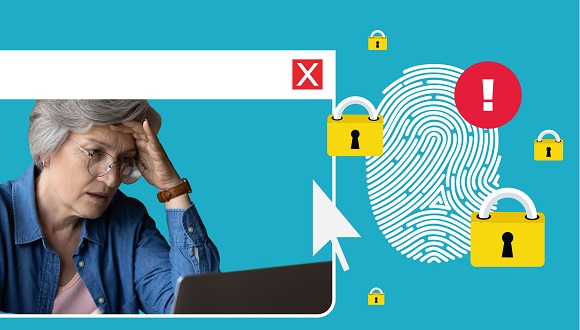With so much of our personal information available online, criminals no longer need to go through our trash cans for important documents. 
Your digital identity is an online record of your personal information. It could include something as simple as your email address or social media handle, or more sensitive information like your social insurance number (SIN), passwords and even your financial information. Every time you do something actionable online, like access your social media or sign up for an email subscription, your digital identity grows. This information says a lot about you, so protecting it is crucial.
Here are a few tips on how you can protect your digital identity to get cyber safe.
Watch out for phishing scams
Cyber criminals may use phishing scams to steal your digital identity. In a phishing attack, a scammer will send you an email or text to trick you into sharing personal information by asking you to click a malicious link or download a suspicious file.
Spear phishing scams are hyper-targeted phishing scams in which cyber criminals gather information about you to create a personalized message. This message might impersonate someone you know or be specific to your behaviours, likes or interests. Spear phishing messages can be especially dangerous as they may be harder to spot than generic phishing messages.
It’s always important to double-check the legitimacy of a message if anything seems off. Contact the company or person who is sending you the message through another medium, like a phone call, to confirm whether the message is real. Keep an eye out for suspicious language, like threats or rewards that seem too good to be true. Avoid clicking on links or opening attachments in suspicious messages.
Protect your information
When you share information online, you expect it to stay private – which is why you should always take steps to protect your information.
Cyber criminals can steal your data through an unsecured Wi-Fi network, like the public Wi-Fi at your local coffee shop. Avoid accessing personal accounts or sending sensitive information on public Wi-Fi networks. If you really need to use a public Wi-Fi network, using a VPN will encrypt your data and can prevent it from being compromised.
When it comes to your personal Wi-Fi network, you should always change the default name and password of your network. Setting up your home network properly can create a strong foundation for staying cyber safe.
You should install anti-virus software and firewalls on your personal devices. If your network is vulnerable, a virus could infiltrate your system and expose valuable data. Anti-virus software and firewalls serve as a shield in case a cyber threat breaks through your other defences. You should also ensure all of your devices and software (including your anti-virus software) are updated regularly. Updates fix security issues and vulnerabilities, which will keep your devices and software working properly as they protect you and your digital identity.
Secure your accounts
Securing your online activity and accounts can give your digital identity extra protection.
Your accounts’ first line of defence is a strong password or passphrase. Use unique, complex passwords or passphrases for all of your different accounts. Using a password manager can be a great tool to help you create and organize all of your unique and strong passwords or passphrases. Just make sure you use an extra strong password or passphrase for the password manager account!
Whenever it’s available, enable multi-factor authentication (MFA) on all of your accounts and devices. MFA requires more than one authentication factor to log into your account. This can be what you know (a PIN, password or security question), what you have (your phone or a fob), or what you are (your fingerprint, your face, your eyes, or your voice). Using MFA can stop cyber criminals from accessing your accounts — even if they do manage to get a hold of your password.
Avoid sharing personal information publicly on your social media accounts. You should also review the privacy and security settings on your social media accounts to control who can see what on your profile. Cyber criminals can find information about you through your social media accounts and use it for scams like spear-phishing and identity theft . Make sure you delete and block any “friends” that you don’t know — they could be scammers trying to steal your info.
Accessing your accounts is an easy way for cyber criminals to gain access to all kinds of data. Keep your accounts secure so that your data stays private and out of their hands.
Conclusion
In the digital age, it’s nearly impossible to avoid having your personal information online. This makes it critical to protect your digital identity. By watching out for phishing scams, protecting your information and securing your accounts, you can stay cyber safe and help defend yourself against digital identity theft.
For more information on protecting your digital identity, check out the Canadian Centre for Cyber Security's publication Protecting Yourself From Identity Theft.